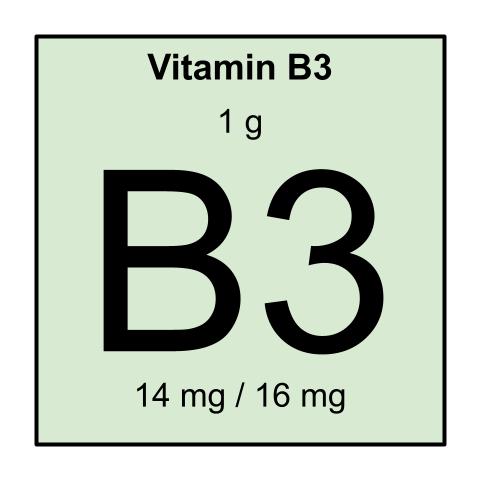Vitamin B3 is important for maintaining the heart, nervous system, and for neurological development, helps the digestive system function, is needed to produce stomach acid, is needed to produce DNA, promotes healthy skin, may help treat age-related macular degeneration, may help regulate cholesterol, helps slow atherosclerosis and reduce risk of heart attack, niacinamide (a form of B3 used in supplements) may prevent diabetes, it may help treat osteoarthritis and may help prevent Alzheimer’s disease. Sources include beans, milk, meat, eggs, mushrooms, raw rice bran, tuna, beef liver, brewer’s yeast, chicken breast, corn flour, and cheese.
Quick Facts
-Three forms of B3: nicotinamide, niacin, and nicotinamide riboside, which are all converted to nicotinamide adenine dinucleotide (NAD). NAD is a cofactor used in all human cells for many metabolic processes
-Needed to produce energy from food
-Important for maintaining heart, nervous system, neurological development [48], helps digestive system function, needed to produce stomach acid, needed to produce DNA, promotes healthy skin, may help treat age-related macular degeneration, in clinical settings high doses reduce LDL “bad” cholesterol and triglycerides and increases HDL “good” cholesterol, helps slow atherosclerosis and reduce risk of heart attack, niacinamide (a form of B3 used in supplements) may prevent diabetes, may help treat osteoarthritis, may help prevent Alzheimer’s disease [160]
-Precursor to coenzymes NAD and NADH
-Can also be made in the body from tryptophan, and amino acid. If enough tryptophan is eaten in the diet, B3 is not needed and is technically no longer considered a vitamin
[48]
RDI
Males 19 – 30 yrs: 16 mg
Females 19 – 30 yrs: 14 mg
[128]
Deficiency
-Dry, cracked, scaly skin, pellagra: indicated by dermatitis, diarrhea and dementia, feeling tired or weak, muscular weakness, loss of appetite, gastrointestinal disturbances, depression, irritability, anxiety or confusion
-Severe: may cause dementia [160]
Toxicity
-Usually have to be taking over 1 – 2 grams per day [165]
-Toxicity from regular supplement doses is unlikely. -Toxicity from enriched foods is not possible.
-Toxicity from excessive supplement doses can happen. Mild symptoms include nausea, stomach upset, abnormal liver tests, muscle breakdown and flushing [166]. Severe/overdose symptoms include severe skin flushing, dizziness, rapid heartbeat, itching, nausea and vomiting, abdominal pain, diarrhea, gout. Abnormal liver tests and liver damage [167].
Sources
Beans, milk, meat, eggs [48], mushrooms, raw rice bran, tuna, beef liver, brewer’s yeast, chicken breast, corn flour, cheese, halibut, peanuts, pork, salmon, shrimp and scallops, sea vegetables, asparagus, broccoli, carrots, collard greens, green peas, mustard greens, romaine lettuce, tomatoes, turkey, whole wheat [160]

